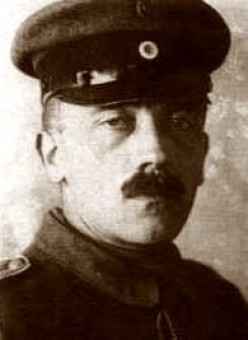
1918 November 21 Since October 15, Gefreiter Adolf Hitler had been recovering from the effects of a British gas attack. Two days after being released from the Prussian Reserve Hospital at Pasewalk, near Berlin, he arrives in Munich for temporary duty with the 7th Company of the First Reserve Battalion of the 2nd Infantry Regiment. Almost 30 years old, without prospects, career, or education, Hitler's only immediate plan is to try to remain in the army, his only real home since the death of his mother on 21 December 1907. 1
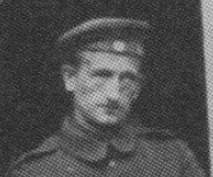
Ernst Schmidt
In Munich, Hitler is happily reunited with Ernst Schmidt, his closest front-line comrade to have survived the war. After arrival at the List Regiment barracks, they will soon become bored with barracks life, and apply for guard duty at a prisoner-of-war camp in Traunstein, a small town near the Austrian frontier. 2
1918 December 18 Among a group of fifteen men from their company, Hitler and Schmidt are transferred to the prisoner-of-war camp at Traunstein for temporary guard duty. They have little contact with the approximately 1,000 prisoners, who are mostly Russian, while about a third are British. Their duty at Traunstein is limited to guarding the front gate, in 24-hour shifts. The camp itself is in the process of being disbanded, and all the prisoners will have been transferred elsewhere by February 1919. 3
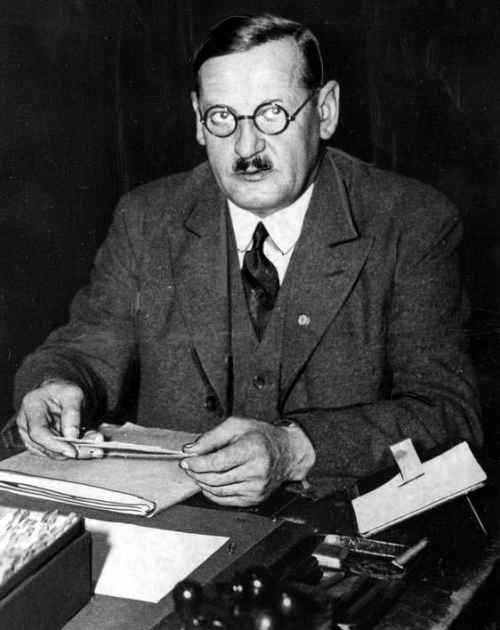
1919 February 5 The first meeting of Anton Drexler's German Worker's Party (DAP) takes place in Munich's Fuerstenfelder Hof. The new 'party' will continue to hold small weekly meetings during the following months. 4
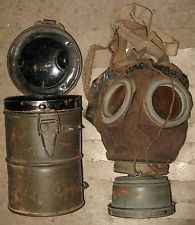
1919 February 12 Officially assigned to the 2nd Demobilization Company, to await discharge sometime in May, Hitler and Schmidt return from Traunstein to the List Regiment barracks in Munich. The two will spend most of the next few months earning three marks a day for examining gas masks that will never again be used. They unscrew the mouthpieces, look them over, decide whether or not they are in working order, and place an appropriate tag on them. After long days of such tedious make-work, Schmidt and Hitler often attend the Munich Opera in the evenings, to unwind. . 5
1919 February 20–Early March Hitler is assigned to temporary guard duty at the Central Railway Station, where a unit of his company is responsible for maintaining order among the many soldiers traveling to and from Munich. At the end of these few weeks, he will return to the List Regiment Barracks and inspecting gas masks. 6
1919 February 21 Kurt Eisner, the Jewish leader of the Bavarian Socialist Republic, is assassinated by Count Anton Arco-Valley, a cavalry officer who hated Socialism. Although the assassin's mother was Jewish, he had applied to join an anti-Semitic group, but was rejected because of his mother. It might be that the assassination was an attempt to prove himself worthy of membership. 7
1919 April 3 A routine order of the demobilization battalion refers to Hitler as the representative (Vertrauensmann) of the List Regiment Barracks. This position saved him from being discharged from the army in May, which would otherwise have been his fate. 8
1919 April 7 Max Levien, a member of the German Communist Party (KPD), declares the establishment of the Bavarian Soviet Republic.
Schmidt: "He [Hitler] hadn't much to say about the revolution, but it was plain to see how bitter he felt." 9
1919 April 13 A right-wing uprising in Munich is put down by armed workers after brief skirmishing. A Soviet-style republic is soon proclaimed and a Red Guard is formed, even as the 30,000-strong right-wing Freikorps of General Ritter von Epp prepares to advance on Munich. 10
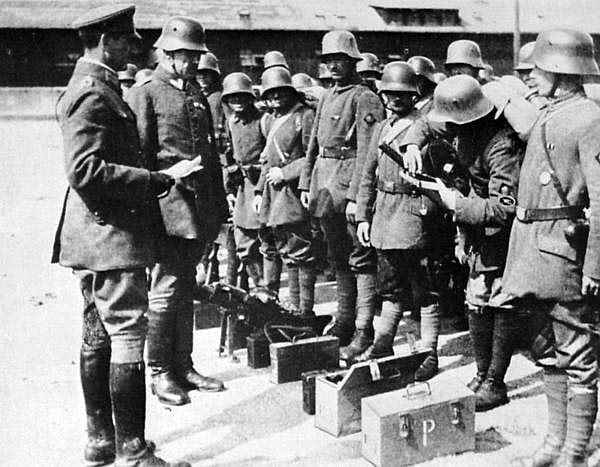
The Freikorps Epp is a paramilitary formation organized by Franz Ritter von Epp (above), a highly decorated regular officer in the Imperial German Army who will become Reichsstatthalter of Bavaria under the Nazis. Made up mostly of war veterans, the Freikorps Epp counts Ernst Roehm—who will go on to lead the Nazi SA—among its members.
1919 April 14 At the height of Munich's "red dictatorship," the Munich Soldiers' Council authorizes fresh elections of barrack representatives to ensure that the Munich garrison stands loyally behind the new regime. 11
1919 April 15 Hitler is elected Deputy Battalion Representative of the List Regiment Barracks; John Blueml is chosen as Battalion Representative, with 38 votes to Hitler's 19. As Ian Kershaw has observed, Hitler thus not only does nothing to assist the crushing of the "Red Republic," but was an elected representative of his battalion during the whole period of the Munich republic. 12
1919 April 26 According to Hitler's account in Mein Kampf, a delegation of Red Guards call on the List Regiment for volunteers. Hitler writes that he jumped on a chair and harangued the soldiers, pleading with them to remain neutral and not to fight for "a pack of carpetbagging Jews." No other witness to this alleged event has ever come forward. 13
1919 April 27 According to Hitler, in Mein Kampf, three Red Guards come to the List Regiment barracks early in the morning to arrest him, but are dissuaded when they discovered the decorated Gefreiter armed with a loaded carbine. There is no other confirmation of this story either, which is found only in Mein Kampf. Although Schmidt had returned to civilian life, he was still in contact with Hitler. If the incident happened as Hitler later claimed, he would not have failed to inform Schmidt of all the details. It is therefore noteworthy that Schmidt did not hear of the incident, a fact that casts grave doubt upon this unsubstantiated tale. 14
1919 May 1 On this May Day, Lenin, speaking to a crowd in Red Square, proclaims: "The working class, which has liberated itself, now celebrates its day freely and openly not only in Soviet Russia, but in Soviet Bavaria as well." 15
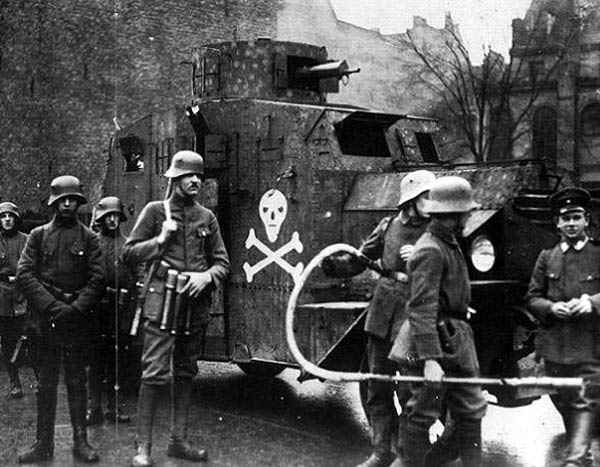
1919 May 1 As the men of the Freikorps enter Munich and fight their way to the center of the city, they are met with rifle fire from the List Regiment barracks. The Red Guards are easily defeated. Hitler, together with everybody else in the barracks, is arrested and imprisoned in the cellars of the Max 11 High School . 16
1919 Mid-May A friendly officer spots Hitler in captivity and orders his release. There is soon an inquiry as to who, exactly, had fired the shots. The result was at least ten executions. In Mein Kampf, Hitler alludes to the fact that he acted as an informer: "A few days after the liberation of Munich I was ordered to report to the Commission of Inquiry on the actions of the 2nd Infantry Regiment during the revolution." 17
Subsequent to the Inquiry hearings, Hitler is listed in the books of the List Regiment as a Vertrauensmann (Representative). "This," Hitler will write, "was my first more or less political activity." The appointment is made by Captain Karl Mayr, in charge of Section I b/P of army intelligence, specializing in propaganda. 18
1919 May 9 The German public learns for the first time of the 440 non-negotiable stipulations in the completed draft of a peace treaty that had just been handed to the German delegation at Versailles. 19
1919 Late May--Early June Hitler is among one of the early list of names of informants (V-Luete, or V-Manner) drawn up by Section I b/P. 20
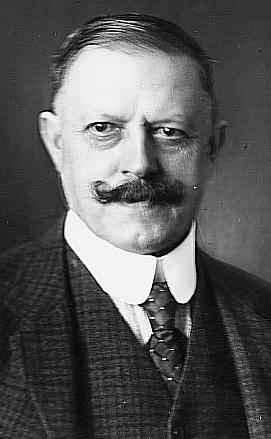
1919 June 5-12 Gefreiter Adolf Hitler is ordered by Captain Mayr (above) to attend army-sponsored political indoctrination courses at the University of Munich. The purpose of the courses is to give returning soldiers a foundation of political philosophy favored by the Reichswehr, but the various instructors are a rather eclectic bunch, and one can hardly characterize the school as having an organized curriculum. Two instructors in particular influence Hitler:
The first is Gottfried Feder, an economist, who will become Hitler's mentor in finance and economics. Feder, a member of the Thule Society, will school Hitler in "Jewish finance capitalism." When Hitler's 25 Point Party Program is eventually drafted, the "Socialist" planks will be Feder's. 21
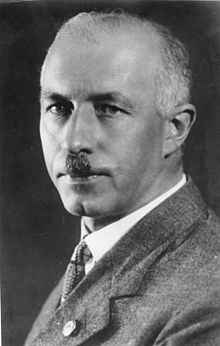
From Mein Kampf: When I heard Gottfried Feder's first lecture on 'The Abolition of the Interest-Servitude', I understood immediately that here was a truth of transcendental importance for the future of the German people. The absolute separation of stock-exchange capital from the economic life of the nation would make it possible to oppose the process of internationalization in German business without at the same time attacking capital as such, for to do this would jeopardize the foundations of our national independence. I clearly saw what was developing in Germany and I realized then that the stiffest fight we would have to wage would not be against the enemy nations but against international capital. In Feder's speech I found an effective rallying-cry for our coming struggle.
The other instructor is Professor Karl Alexander von Mueller, a nationalist historian who taught that the Germans are a master race. At the end of one of the professor's lectures, a soldier rose and protested against his views on the Jews. Hitler takes it upon himself to defend the professor with an army of arguments, speaking with a rising passion and winning the crowd and the point. 22
Again, the source for this story is Hitler's own account; but this time, there is good reason to take him at his word. One of the observers recorded that Hitler was: "A born orator, he commands absolute attention from his listeners and speaks with total conviction."
Professor von Mueller asks Captain Mayr: "Do you know you have a natural orator among your students?" 23
Captain Mayr is sufficiently impressed with Hitler's performance during the course as to list him seventh on a list of twenty-three prospective instructors to be sent for a five-day indoctrination course at the Lechfeld military camp. 24
1919 June 28 The German delegation signs the Treaty of Versailles. 25
1919 July 22-25 Hitler attends political indoctrination classes at Lechfeld, aimed at training him as a Propagandaleute (propaganda agent) for the Reichswehr. The Aufklarungskommando, or clarification detachment, is commanded by Rudolf Beyschlag, and his first report to Captain Mayr will mention Hitler as a sort of straight man, who did a fine job in guiding the discussions after Beyschlag's talks. Subsequent reports to Mayr make it clear that Hitler is the standout among the first group. 26
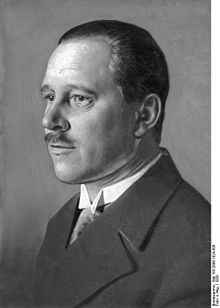
Professor Karl Alexander von Mueller: [After one of my lectures, I encountered a group of students that] stood fascinated around a man in their midst [Hitler] who was addressing them without pause and with growing passion in a strangely guttural voice. I had the strange feeling that the man was feeding on the excitement which he himself had whipped up. I saw a pale, thin face beneath a drooping, unsoldierly strand of hair, with close-cropped mustache, and strikingly large, light blue eyes coldly glistening with fanaticism. 27
1919 August 25 Hitler delivers a propaganda speech called "Capitalism" during his last morning at Lechfeld. Captain Lauterbach, who was in charge of troop indoctrination at Camp Lechfeld, wrote to Mayr that Hitler's speech, while "attractive, clear, and passionate," was also problematic:
Within this speech he [Hitler] came to the question of the Jews—while Hitler was giving his presentation, there arose problems of differences of opinion about how clearly one should utter one's opinion about the Jews. If the question of the Jews were presented in a very clear way, with respect to our Germanic standpoint, if it were done like that, it could give Jews reason to regard these speeches as Jew-baiting. This is why I find it necessary to treat this question as carefully as possible, and too clear hints about a strange race should be avoided. 28
1919 August 25 Hitler, now a Bildungsoffizier (Instruction Officer), returns to Munich and his work with Section I b/P, where he is gaining a reputation as an expert in "the Jewish problem". He also becomes a featured speaker at Lechfeld, for the Press and Propaganda Department of Group Command IV of the Reichswehr. One of the soldiers attending one of Hitler's lectures, Lorenz Frank, recorded: "Herr Hitler especially is, I might say, a born popular speaker who, through his fanaticism and his populist style in a meeting, absolutely compels his audience to take note and share his views." 29
From Mein Kampf: I took up my work with the greatest delight and devotion. Here I was presented with an opportunity of speaking before quite a large audience. I was now able to confirm what I had hitherto merely felt, namely that I had a talent for public speaking. My voice had become so much better that I could be well understood, at least in all parts of the small hall where the soldiers assembled.
No task could have been more pleasing to me than this one; for now, before being demobilized, I was in a position to render useful service to an institution which had been infinitely dear to my heart: namely, the army.
I am able to state that my talks were successful. During the course of my lectures I have led back hundreds and even thousands of my fellow countrymen to their people and their fatherland. I 'nationalized' these troops and by so doing I helped to restore general discipline.
1919 September 12 Adolf Hitler, still in the Reichswehr but wearing civilian clothes, attends his first meeting of the DAP (Deutsche Arbeiterpartei -- German Workers' Party) in the back room of the Sterneckerbrau beer hall. Under orders of Captain Mayr and Major Hierl, Hitler is to infiltrate the Party and report on its activities. 30
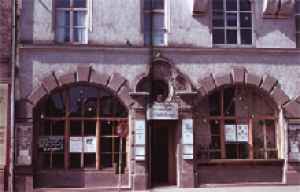
The Sterneckerbrau is one of the smallest of Munich's beer halls, but the DAP at this point in time is in practical need of no larger space. A mere forty men and one woman are present. The featured speaker on this evening was supposed to have been the hard-drinking morphine addict—and anti-Semite—Dietrich Eckart, but an illness had forced a substitution: Gottfried Feder. Since Hitler had heard Feder's views often enough, he grew quite bored and was glad when his speech was over. . 31
In the question period that followed, a diatribe from the floor by an invited guest--a Professor Baumann--demanding a union of Bavaria and Austria, prompts Hitler to take the floor in opposition to the notion. Pointing out that such a move would effectively separate Bavaria from Prussian dominance, Hitler attacks the idea with such force that the previous speaker leaves the hall, in the manner of "a wet poodle," before Hitler has finished speaking. Anton Drexler—a locksmith who had founded the DAP in Munich, with Gottfried Feder and Dietrich Eckart—upon hearing Hitler speak, exclaims: "Goodness, he's got a gob. We could use him." 32
Drexler rushes forward as Hitler is leaving and presses a political pamphlet into his hands, telling him that it contains all he needs to know about the DAP, and urging him to read it. Hitler puts the pamphlet in his pocket and makes his way back to the List Regiment barracks. 33
1919 September 13 In the early morning hours, Hitler, unable to sleep, begins reading Drexler's pamphlet, "My Political Awakening (Mein politisches Erwachen): From the Diary of a German Socialist Worker". Though Hitler was not impressed by the meeting he had attended the night before, Drexler's pamphlet does impress him. 34
From Mein Kampf: In his little book, he described how his mind had thrown off the shackles of the Marxist and trades-union phraseology, and [how] he had come back to the nationalist ideals. That was the reason why he had entitled his little book: "My Political Awakening". The pamphlet secured my attention the moment I began to read, and I read it with interest to the end. The process here described was similar to that which I had experienced in my own case, ten years previously. Unconsciously, my own experiences began to stir again in my mind.
1919 September 16 Hitler receives a postcard saying that he has been accepted as a member of the DAP executive committee, and inviting him to attend a meeting of the committee on September 18. He is not particularly pleased, feeling that they were being presumptuous, but will ultimately accept the invitation. 35
1919 September 16 Hitler's pens his first known political document when Captain Mayr asks him to reply to a September 4 letter from Adolf Gemlich, one of Mayr's former agents, asking for an explicit statement on the proper attitude to be cultivated toward Jews. 36
[For the full text of the Gemlich Letter, Click here.] [See: When Did Hitler Become an Anti-Semite?]
The Gemlich Letter reveals a Hitler who believes that:
1) "Jewry is absolutely a race and not a religious association . . . . There is scarcely a race whose members belong exclusively to just one definite religion."
2) The "irrevocable removal of the Jews in general," by way of legal legislation, is essential.
3) In order to battle the Jews, "a government of national strength" directed by "the ruthless installation of nationally minded leadership personalities with an inner sense of responsibility"—in other words, a dictatorship—is necessary. 37
1919 September 18 Hitler makes his way to the Altes Rosenbad, a run-down tavern in the Herrenstrasse, where the meeting of the DAP's executive committee is held. After a reading of the minutes of the last meeting, the treasurer reported that the total wealth of the Party was seven marks, fifty pfennigs ("not enough to buy a good hat"). "It was all frightful, frightful," Hitler will write later. "This was the life of a little club at the lowest possible level. Was I to join an organization like this?" 38
1919 October 3 Hitler attends another DAP meeting. 39
1919 October 4 Hitler concludes a report to Captain Mayr, about a DAP meeting he had attended the day before, thusly: "I request the Captain's permission to join this association or party, because these men are giving voice to the thoughts of combat veterans." 40
It seems certain that Captain Mayr ordered Hitler to join the DAP—he admits it in his autobiography—and the request above was a just a part of a cover story. The following quote from Mein Kampf gives some clues as to just why Hitler would consider joining such a small, insignificant group:
From Mein Kampf: I began to consider all the pros and cons. I had long ago decided to take an active part in politics. The fact that I could do so only through a new movement was quite clear to me; but I had hitherto lacked the impulse to take concrete action . . . . This ludicrous little formation, with its handful of members, seemed to have the unique advantage of not yet being fossilized into an 'organization,' and still offered a chance for real personal activity on the part of the individual. Here it might still be possible to do some effective work; and, as the movement was still small, one could all the easier give it the required shape. Here it was still possible to determine the character of the movement, the aims to be achieved, and the road to be taken, which would have been impossible in the case of the big parties already existing.
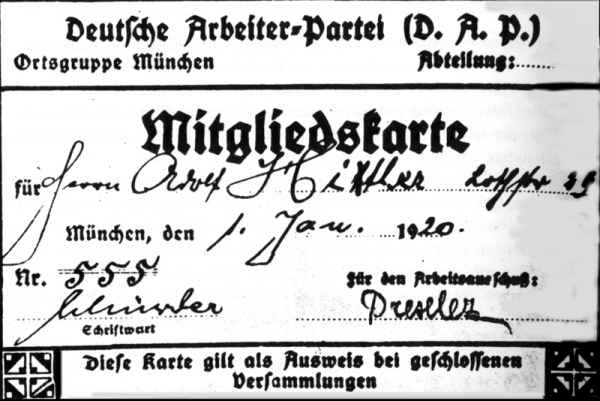
1919 Early October Hitler officially joins the DAP, by order of Captain Mayr, and is given membership card #555 (the numbering had started at 500). (Since Hitler is still in the army, this is all technically illegal.) Mayr will continue to support Hitler, to the tune of 20 gold marks a week, until his discharge on 31 March 1920. Hitler will also continue to live and eat in the List Regiment Barracks, and continue to receive speaking fees, all of which will greatly assist him in his next task; to build up the DAP into a respectable party. 41
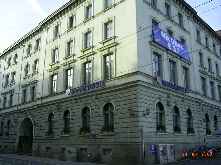
1919 October 16 Hitler, who has spent much time and energy planning a public DAP rally to be held in front of a large crowd, delivers a 30-minute speech at the Hofbraukeller—a large drinking saloon in Munich—in front of 111 people. One of four speakers, he has never appeared before so large an audience. 42
Not only was Hitler's speech well-received, but also the respectable sum of 300 marks was collected. Hitler, with this success of his strategy demonstrated, wisely convinces the other members to put this windfall toward planning an even larger public rally in an even larger hall. Hitler would write in Mein Kampf that he considered this speech as marking the beginning of his political career. 43
1919 October 17 From a story in the Muenchener Boebachter: "Herr Hitler of the German Workers Party used inflammatory words in urging the necessity for concerted action against the common enemy of all nations, and he particularly stressed support for true German press, so that people can learn what is supposed by the Jewish-controlled newspapers." 44
Next: The Beer Hall Agitator.



 Written by Walther Johann von Löpp
Written by Walther Johann von Löpp
Copyright © 2011-2013 All Rights Reserved
Edited by Levi Bookin — Copy Editor
European History and Jewish Studies





Click to join 3rdReichStudies

Disclaimer:The Propagander!™ includes diverse and controversial materials--such as excerpts from the writings of racists and anti-Semites--so that its readers can learn the nature and extent of hate and anti-Semitic discourse. It is our sincere belief that only the informed citizen can prevail over the ignorance of Racialist "thought." Far from approving these writings, The Propagander!™ condemns racism in all of its forms and manifestations.
Fair Use Notice: This site--The Propagander!™--may contain copyrighted material the use of which has not always been specifically authorized by the copyright owner. We are making such material available in our efforts to advance understanding of historical, political, human rights, economic, democracy, scientific, environmental, and social justice issues, etc. We believe this constitutes a "fair use" of any such copyrighted material as provided for in section 107 of the US Copyright Law. In accordance with Title 17 U.S.C. Section 107, the material on this site is distributed without profit to those who have expressed a prior interest in receiving the included information for research and educational purposes. If you wish to use copyrighted material from this site for purposes of your own that go beyond 'fair use', you must obtain permission from the copyright owner.





















Written by Walther Johann von Löpp




